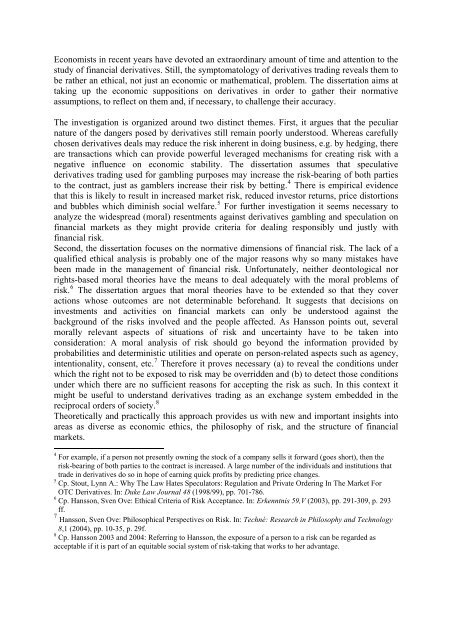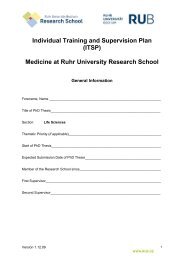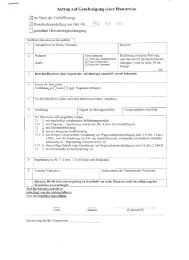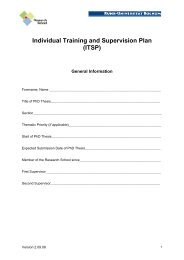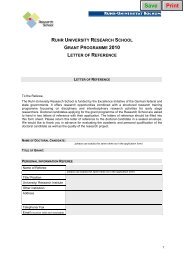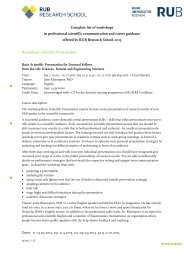Section Days abstract book 2010.indd - RUB Research School ...
Section Days abstract book 2010.indd - RUB Research School ...
Section Days abstract book 2010.indd - RUB Research School ...
Create successful ePaper yourself
Turn your PDF publications into a flip-book with our unique Google optimized e-Paper software.
Economists in recent years have devoted an extraordinary amount of time and attention to the<br />
study of financial derivatives. Still, the symptomatology of derivatives trading reveals them to<br />
be rather an ethical, not just an economic or mathematical, problem. The dissertation aims at<br />
taking up the economic suppositions on derivatives in order to gather their normative<br />
assumptions, to reflect on them and, if necessary, to challenge their accuracy.<br />
The investigation is organized around two distinct themes. First, it argues that the peculiar<br />
nature of the dangers posed by derivatives still remain poorly understood. Whereas carefully<br />
chosen derivatives deals may reduce the risk inherent in doing business, e.g. by hedging, there<br />
are transactions which can provide powerful leveraged mechanisms for creating risk with a<br />
negative influence on economic stability. The dissertation assumes that speculative<br />
derivatives trading used for gambling purposes may increase the risk-bearing of both parties<br />
to the contract, just as gamblers increase their risk by betting. 4 There is empirical evidence<br />
that this is likely to result in increased market risk, reduced investor returns, price distortions<br />
and bubbles which diminish social welfare. 5 For further investigation it seems necessary to<br />
analyze the widespread (moral) resentments against derivatives gambling and speculation on<br />
financial markets as they might provide criteria for dealing responsibly und justly with<br />
financial risk.<br />
Second, the dissertation focuses on the normative dimensions of financial risk. The lack of a<br />
qualified ethical analysis is probably one of the major reasons why so many mistakes have<br />
been made in the management of financial risk. Unfortunately, neither deontological nor<br />
rights-based moral theories have the means to deal adequately with the moral problems of<br />
risk. 6 The dissertation argues that moral theories have to be extended so that they cover<br />
actions whose outcomes are not determinable beforehand. It suggests that decisions on<br />
investments and activities on financial markets can only be understood against the<br />
background of the risks involved and the people affected. As Hansson points out, several<br />
morally relevant aspects of situations of risk and uncertainty have to be taken into<br />
consideration: A moral analysis of risk should go beyond the information provided by<br />
probabilities and deterministic utilities and operate on person-related aspects such as agency,<br />
intentionality, consent, etc. 7 Therefore it proves necessary (a) to reveal the conditions under<br />
which the right not to be exposed to risk may be overridden and (b) to detect those conditions<br />
under which there are no sufficient reasons for accepting the risk as such. In this context it<br />
might be useful to understand derivatives trading as an exchange system embedded in the<br />
reciprocal orders of society. 8<br />
Theoretically and practically this approach provides us with new and important insights into<br />
areas as diverse as economic ethics, the philosophy of risk, and the structure of financial<br />
markets.<br />
4<br />
For example, if a person not presently owning the stock of a company sells it forward (goes short), then the<br />
risk-bearing of both parties to the contract is increased. A large number of the individuals and institutions that<br />
trade in derivatives do so in hope of earning quick profits by predicting price changes.<br />
5<br />
Cp. Stout, Lynn A.: Why The Law Hates Speculators: Regulation and Private Ordering In The Market For<br />
OTC Derivatives. In: Duke Law Journal 48 (1998/99), pp. 701-786.<br />
6<br />
Cp. Hansson, Sven Ove: Ethical Criteria of Risk Acceptance. In: Erkenntnis 59,V (2003), pp. 291-309, p. 293<br />
ff.<br />
7<br />
Hansson, Sven Ove: Philosophical Perspectives on Risk. In: Techné: <strong>Research</strong> in Philosophy and Technology<br />
8,1 (2004), pp. 10-35, p. 29f.<br />
8<br />
Cp. Hansson 2003 and 2004: Referring to Hansson, the exposure of a person to a risk can be regarded as<br />
acceptable if it is part of an equitable social system of risk-taking that works to her advantage.


